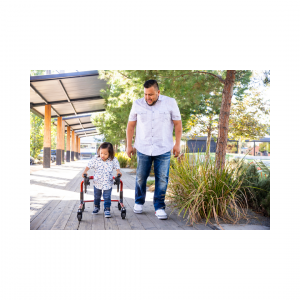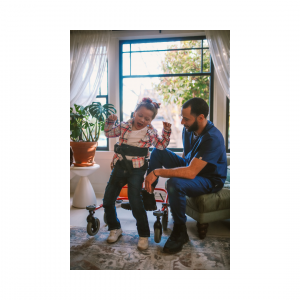

Gait Training in Children: Physical Therapy and Pediatric Gait Abnormalities
Gait abnormalities in children can result from a variety of causes, including muscle weakness, tightness, and imbalances, as well as congenital conditions and neurological issues. Physical therapy can be an effective treatment option for improving gait abnormalities in children and supporting their overall mobility and development.
Gait analysis: Physical therapists will perform a comprehensive evaluation of the child’s gait to identify any abnormalities and determine the underlying cause. They may observe the child walking, watch for any asymmetries or deviations in their gait pattern, and perform a thorough evaluation of their musculoskeletal and neurological systems. Based on this evaluation, the therapist will create a customized treatment plan to address the child’s specific needs.
Strengthening exercises: Physical therapists may use exercises to strengthen the muscles that support the child’s gait, including the legs, hips, and core. This can help improve stability, balance, and coordination during walking.
Stretching exercises: Tight muscles can contribute to gait abnormalities, so physical therapists may also use stretching exercises to improve flexibility and reduce tightness in the legs, hips, and back.
Balance and Coordination training: Physical therapists may use balance training activities to help the child develop the skills they need to maintain balance and stability while walking. Children with gait abnormalities often struggle with balance and coordination, so physical therapists may use various activities to improve these skills. This may include balance boards, obstacle courses, and therapeutic games.
Orthotic and Assistive devices: In some cases, physical therapists may recommend orthotic devices such as braces or foot orthotics to improve the child’s gait. These devices can help provide stability and support to the lower extremities and improve overall gait mechanics. Physical therapists may also recommend the use of assistive devices such as crutches, walkers to improve the child’s gait. The therapist will work with the child to ensure they are properly using the device and that it is comfortable and supportive.
Gait training: Physical therapists may also use gait training techniques to help the child improve their walking pattern. This may involve the use of assistive devices, such as crutches or walkers, as well as training in safe and efficient gait patterns.
Home Exercise program: Physical therapists can also provide education and guidance to the child and their family on how to maintain and improve the child’s gait and mobility. This may include instructions on proper posture, exercises to do at home, and advice on shoes and orthotics to support the child’s gait.
Overall, physical therapy can be a valuable resource for children with gait abnormalities. Physical therapists can perform a comprehensive evaluation, use a variety of treatment techniques, and provide education and guidance to the child and their caregivers to support their progress and improve their gait and enhance their overall quality of life.
In conclusion, physical therapy can play an important role in improving gait abnormalities in children. Through gait analysis, strengthening exercises, stretching, balance training and orthotic devices, physical therapists can help children develop the skills and stability they need for comfortable and efficient walking. If your child is struggling with gait abnormalities, consider seeking the help of a physical therapist for a comprehensive evaluation and personalized treatment plan.